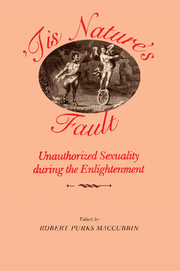Book contents
- Frontmatter
- Contents
- Introduction
- “The Secrets of Generation Display'd”: Aristotle's Master-piece in Eighteenth-Century England
- Sexual Imagination as Revealed in the Traité des superstitions of Abbé Jean-Baptiste Thiers
- Married but not Churched: Plebeian Sexual Relations and Marital Nonconformity in Eighteenth-Century Britain
- Moral Values in “La Suite de l'Entretien”
- Prostitution and Reform in Eighteenth-Century England
- The Properties of Libertinism
- Between the Licit and the Illicit: the Sexuality of the King
- The Sublimations of a Fetishist: Restif de la Bretonne (1734-1806)
- Sodomitical Subcultures, Sodomitical Roles, and the Gender Revolution of the Eighteenth Century: The Recent Historiography
- The Priest, the Philosopher, and Homosexuality in Enlightenment France
- The Pursuit of Homosexuality in the Eighteenth Century: “Utterly Confused Category” and/or Rich Repository?
- Sodomy in the Dutch Republic during the Eighteenth Century
- Parisian Homosexuals Create a Lifestyle, 1700-1750: The Police Archives
- The Censor Censured: Expurgating Memoirs of a Woman of Pleasure
- Chthonic and Pelagic Metaphorization in Eighteenth-Century English Erotica
- Modes of Discourse and the Language of Sexual Reference in Eighteenth-Century French Fiction
- The Mélange de poésies diverses (1781) and the Diffusion of Manuscript Pornography in Eighteenth-Century France
- Obscene Literature in Eighteenth-Century Italy: an Historical and Bibliographical Note
The Censor Censured: Expurgating Memoirs of a Woman of Pleasure
Published online by Cambridge University Press: 06 July 2010
- Frontmatter
- Contents
- Introduction
- “The Secrets of Generation Display'd”: Aristotle's Master-piece in Eighteenth-Century England
- Sexual Imagination as Revealed in the Traité des superstitions of Abbé Jean-Baptiste Thiers
- Married but not Churched: Plebeian Sexual Relations and Marital Nonconformity in Eighteenth-Century Britain
- Moral Values in “La Suite de l'Entretien”
- Prostitution and Reform in Eighteenth-Century England
- The Properties of Libertinism
- Between the Licit and the Illicit: the Sexuality of the King
- The Sublimations of a Fetishist: Restif de la Bretonne (1734-1806)
- Sodomitical Subcultures, Sodomitical Roles, and the Gender Revolution of the Eighteenth Century: The Recent Historiography
- The Priest, the Philosopher, and Homosexuality in Enlightenment France
- The Pursuit of Homosexuality in the Eighteenth Century: “Utterly Confused Category” and/or Rich Repository?
- Sodomy in the Dutch Republic during the Eighteenth Century
- Parisian Homosexuals Create a Lifestyle, 1700-1750: The Police Archives
- The Censor Censured: Expurgating Memoirs of a Woman of Pleasure
- Chthonic and Pelagic Metaphorization in Eighteenth-Century English Erotica
- Modes of Discourse and the Language of Sexual Reference in Eighteenth-Century French Fiction
- The Mélange de poésies diverses (1781) and the Diffusion of Manuscript Pornography in Eighteenth-Century France
- Obscene Literature in Eighteenth-Century Italy: an Historical and Bibliographical Note
Summary
My Lord Duke
Your Grace ordered a prosecution against the Printer and publisher of the Memoires of a Lady of Pleasure. The same Bookseller, one Griffiths (as I apprehend) has published within a few Days a Book called Memoires of Fanny Hill, the Lewdest thing I ever saw; It is, I am told, the same with the other, after leaving out some things, which were thought most liable to the Law and to expose the Author and publisher to punishment—But if there is not Law enough in the Country to reach this vile Book after all the pretence to correct it, we are in a deplorable condition.
I beg of your Grace to give proper orders, to stop the progress of this vile Book, which is an open insult upon Religion and good manners, and a reproach to the Honour of the Government, and the Law of the Country.
The writer of this splenetic letter (15 March 1750) is Thomas Sherlock, Bishop of London, who in addressing the Duke of Newcastle, Secretary of State, is urging him to suppress a newly published work, Memoirs of Fanny Hill, an expurgated version of John Cleland's Memoirs of a Woman of Pleasure. The unabridged edition, as Sherlock points out, had already been prosecuted and suppressed. Less than four months earlier, on 24 November 1749, Cleland, the printer Thomas Parker, and the publisher Ralph Griffiths had all appeared in court, charged with producing an obscene book.
- Type
- Chapter
- Information
- 'Tis Nature's FaultUnauthorized Sexuality during the Enlightenment, pp. 192 - 201Publisher: Cambridge University PressPrint publication year: 1988



